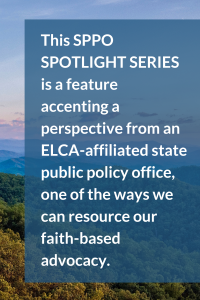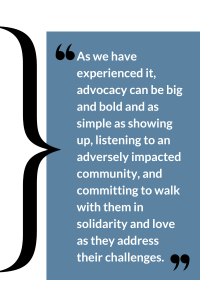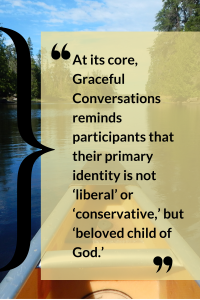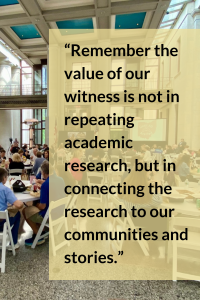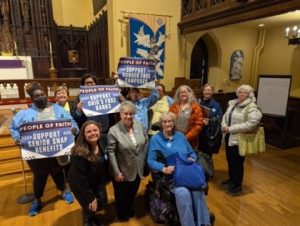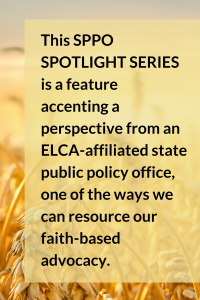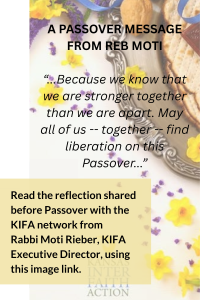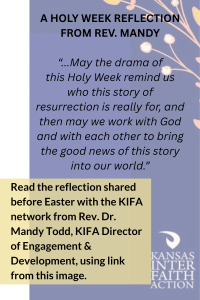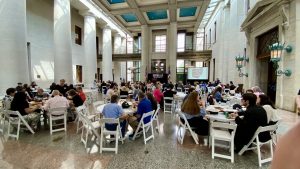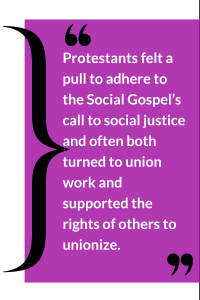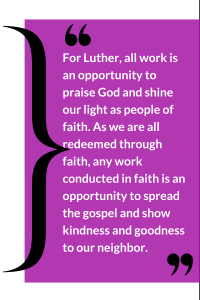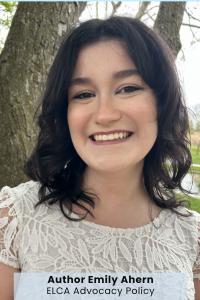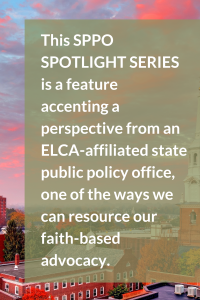Following are updates shared from submissions from ELCA-affiliated state public policy offices (sppos) this quarter. Submissions include updates on what has been going on at sppos across our network. Full list and map of sppos available.
Kansas | Minnesota | Pennsylvania | Texas
Kansas Interfaith Action (KIFA)
Over these past few months, Kansas Interfaith Action (KIFA) has been maintaining and increasing its focus on community building and mutual support through a variety of engaging programs. Following our highly successful Advocacy Day in mid-March, which drew nearly 200 attendees, our efforts have centered on mobilizing our community in the face of ongoing challenges.
A significant highlight was our most successful Annual Event to date at the end of May, which brought together nearly 200 people. This event not only celebrated our shared work but also raised crucial funds to support our mission. We were honored to have Amanda Tyler, author of How to End Christian Nationalism, as our keynote speaker. Her powerful message continued to inspire our work, leading to our June “KIFA Convos” event, where we engaged in a meaningful discussion of her book with our community.
In July, we were proud to partner with the Kairos Center to host a book tour for Rev. Liz Theoharis and Noam Sandweiss-Back, authors of You Only Get What You’re Organized to Take: Lessons from the Movement to End Poverty, with multiple stops in our state. We organized successful stops in Topeka, Wichita, and Kansas City, providing our community with a roadmap for igniting a new era of movement-building and civic awakening.
These events directly connect to our advocacy on the budget reconciliation bill , the federal budget bill that poses a severe threat to our social safety net with disastrous implications. We took action by issuing an urgent alert to our base, detailing how the legislation would slash over $800 billion from healthcare and Medicaid and $300 billion from SNAP, leaving millions of Kansans vulnerable. Unfortunately, our Congresspeople ignored our majority will, phone calls, and emails on the issue. In June, we hosted an online forum on the issue with expert panelists to deepen our community’s understanding of this legislation and provide a clear call to action. We also published a guest commentary in the Kansas City Star, in which author Mandy Todd referenced “One Big Bad Bill,” further solidifying our stance and engaging a broader audience on this critical issue. These efforts underscore our commitment to acting on hope and fighting for justice and dignity for all our neighbors in Kansas.
Furthermore, in response to the recent immigration raids in Lenexa and Kansas City on July 30, we have continued to keep immigration rights front and center. Condemning the raids that resulted in the arrest of as many as 12 workers, we released a statement highlighting our belief in the dignity of all people and the scriptural command to “welcome the stranger.” Rabbi Moti also spoke out in partnership with Advocates for Immigration Rights and Reconciliation (AIRR) in their response to those raids in Johnson and Wyandotte Counties.
This came mere weeks after we held an immigration prayer vigil at St. Andrew Christian Church in Olathe, bringing together a packed sanctuary of supporters and allied organizations to send a clear, patriotic message that immigrants make America and Kansas great. That’s why we hosted this vigil right before the fourth of July.
Lutheran Advocacy – Minnesota (LA-MN)
Political Violence: On June 14th, Speaker Emerita Melissa Hortman and her husband Mark were killed, and Senator John Hoffman and his wife Yvette were hospitalized in a shocking act of political violence. Another 70 leaders were on the assailant’s target list, with two narrowly spared thanks to local police and unexpected travel. As people of faith, we know these issues can’t be solved by policy alone. That’s why we’re lifting up Graceful Conversations, our five-session resource that helps us talk across differences by remembering our shared identity as beloved children of God.
Political Violence Statement & Worship: Following the tragedy, Lutheran Advocacy – Minnesota (LA-MN) issued a public statement naming our shared grief and rejecting the division, extremism, and misinformation fueling violence. You can read the full statement, along with a devotion led by Rev. Rebel Hurd (NW MN Synod), on our website (scroll down).
Resource Collection: We’re building a new online hub to help congregations get at the roots of political violence. It will feature resources on misinformation, media literacy, Christian nationalism, and other drivers of division – plus book recommendations, discussion guides, and practical congregational tools.
Media Literacy: Misinformation continues to threaten our communities and democracy. To help, LA-MN has developed a new resource to strengthen media literacy, equipping advocates to evaluate sources, spot logical fallacies, and resist manipulation.
Jake’s Contributions
We are so grateful for Hunger Advocacy Fellow Jake Summerville, who has been a huge part of this work over the past year (including with the resources noted above). His leadership and energy will be greatly missed!
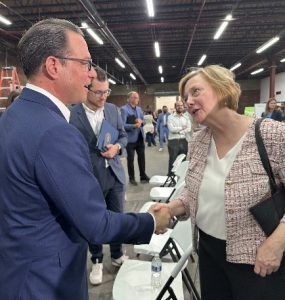
LAMPa Director Tracey DePasquale thanks Gov. Josh Shapiro for calling out the harm done by the federal withholding of appropriated funds to fight hunger and support farmers.
Lutheran Advocacy Ministry Pennsylvania (LAMPa)
After record turnout for Lutheran Advocacy Ministry Pennsylvania (LAMPa’s) annual day In the Capitol in May, Lutherans continued their state-level advocacy, signing hundreds of postcards at six synod assemblies, urging the General Assembly to support funding to fight hunger and asking Governor Josh Shapiro to stand up for LGBTQ+ health care. LAMPa staff also joined our hunger coalition partners at a press conference with the governor to highlight the impact of federal funding stoppages to food insecure neighbors as he announced a lawsuit seeking the release of federal funds appropriated for a program that supports charitable food system purchases from local farmers.
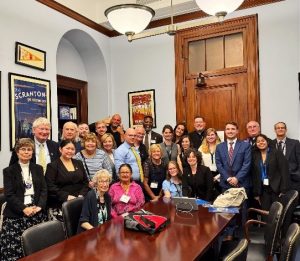
Pennsylvania Lutherans and ecumenical partners meet with Sen. John Fetterman, who agreed to support their request to oppose cuts to anti-hunger programs.
Many of LAMPa’s priorities passed the House, but stalled in the Senate as the legislature missed its June 30 budget deadline, leaving the state without a spending plan as of mid-August.
In early summer, LAMPa assisted ELCA Advocacy staff in connecting Pennsylvania Lutherans to their members of Congress about the impact of potential cuts to SNAP and Medicaid as well as other domestic and global programs to fight hunger and disease.
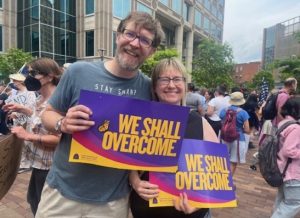
Pastor Erin Joines, LAMPa communications and advocacy engagement manager, and her husband, Dr. Tim Jones, stand in solidarity with Pittsburgh’s immigrant community.
LAMPa staff accompanied constituents on Hill visits in Washington, D.C. Pennsylvania Lutherans have responded overwhelmingly in support of immigrant neighbors –meeting with county and local officials and sending near-record number of letters to the governor to discourage collaboration with ICE beyond what is legally mandated. LAMPa has been accompanying peaceful protestors and connecting volunteers for rapid response networks to provide assistance to families and communities in the event of ICE raids.
The Texas Impact staff and members spent the summer preparing for a called 30 day special session preparing to work on key legislative issues such as addressing disaster relief and other element of the Texas Impact 2025-2026 Legislative Agenda. Action on those bills has been delayed as the Texas House Democrats broke quorum to prevent racially-charged congressional redistricting maps from passing in the first special session. We expect additional special sessions until congressional redistricting is resolved.
Lutherans have been key participants in Texas Impact issue teams with great ELCA participation in teams related to public schools, climate action, reproductive policy, ending gun violence, immigration and the Rapid Response Team. Each team met virtually every week during the legislative session and are meeting bi-weekly during the interim.
The Texas Faith Votes teams are meeting to prepare for the upcoming constitutional elections and the 2026 primary and general elections.

